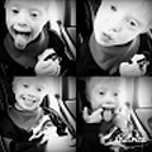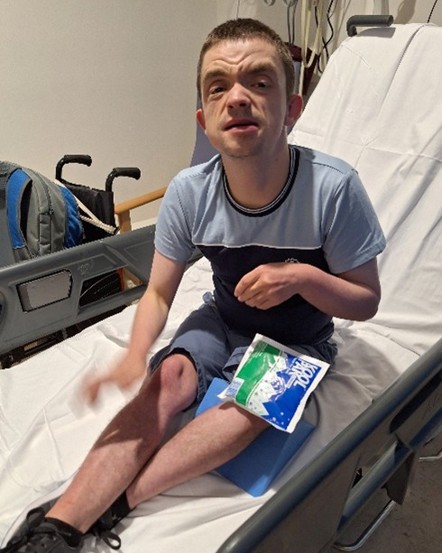Down’s Syndrome Awareness Month: Self Awareness

Kerry Fender
Down’s Syndrome, my family and me – one mum’s account of family life with an extra chromosome.

Most people are aware of Down’s Syndrome, in as much as they can recognise when they see a person with it and are aware of what they THINK it is. Most people seeing my son would be aware that he has Down’s Syndrome. But what about Freddie himself? Does he NEED to be aware that he has it?
It was seldom, if ever, necessary to mention it at home. At home, Freddie was just Freddie, just one more quirky individual in an already quite quirky family, a child with his own particular set of needs, just as his brother and sister each had their own particular needs which were not the same as each other’s or those of the kid down the road.
When you came right down to brass tacks, his needs weren’t that much different to most people’s really. On a day-to-day basis, we didn’t really think about Down’s Syndrome at all. As far as Freddie was concerned, he was no different to anyone else.
But then I thought: what if he overhears us talking, to a doctor or another professional, or someone else? What if he realised we were talking about him and thought it was some kind of secret, something to keep quiet or be ashamed of? Or what if he heard it from someone else, somebody with incorrect and outdated ideas of what Down’s Syndrome is? What if his first introduction to the fact that he has Down’s Syndrome was someone else’s negative misconceptions?
An incident occurred that demonstrated to me just how easily this could happen.
Luckily, that time, Freddie remained blissfully unaware, but it made me realise that he needed to know, and he needed to hear it from us, so that we could take charge of the narrative and equip him with the correct information. But how to broach the subject with him? We didn’t want to make a big deal of it, we just wanted to present it as a fact, like his blue eyes and pale sandy-coloured hair are facts.
As it happened, a natural opportunity presented itself when I told him one day that we had an appointment at the Orthotic clinic to get him measured up for new boots. He asked me why we had to go the clinic to get boots for him. I explained that he has a thing called Down’s Syndrome and that some people with Down’s Syndrome have extra-stretchy tendons that can make their legs very tired and achy when they were walking.
He didn’t ask many questions about it on the day or afterwards, but now that we had broached the subject, I would occasionally point it out to him if I saw someone with Down’s Syndrome on TV, just so he’d know he wasn’t alone – role models, if you like - but he never showed any great interest, to be honest.
Then one day, we bumped into an acquaintance of mine who also has a young person with Down’s Syndrome. We chatted for a while, then said goodbye. Freddie and I went into a café, and as we were waiting at the counter, he asked me how old the young person was. I told him they were the same age as him. He noted that, also like him sometimes, the young person was using a wheelchair.
I took the plunge and asked him if he had noticed anything else they had in common
He said they both wore glasses. “Anything else?” I fished, wanting to test his understanding, to see if he noticed. But he hadn’t, so I told him that they, too, had Down’s Syndrome.
This time he asked questions and I answered them in straightforward terms, talking about chromosomes, which I described as ‘building blocks’. We talked in simple, general terms about what it might mean for someone if they have it, and about how it was a part of who he is, but only a small part.
Then he suddenly (and randomly) announced that he’d like to be a barista and a baker in a coffee shop just like the one we were sitting in, so we started talking about that instead.
Afterwards I was browsing in a shop when Freddie suddenly shouted, loudly: ‘Has she got Down’s Syndrome?’ Out of the corner of my eye I could see a pushchair, and at that moment I wanted the floor to swallow me up, imagining what the child’s mother would make of Freddie’s pronouncement. But a voice piped up: ‘Yes, that’s right, she has!’
Since then, Freddie has asked me a few times if he has Down’s Syndrome, do I have Down’s Syndrome, does Nana, does his sister? So it seems like he is beginning to explore his understanding of it.
One thing I do hope he understands is that we wouldn’t have him any other way.


